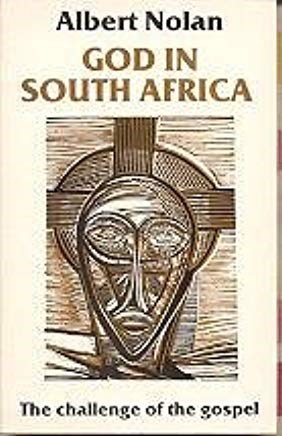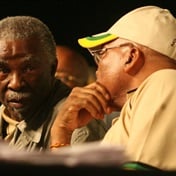
Confronting the stark reality of recession, unemployment and corruption many South Africans face collective despair.
As witnesses testifying at the Zondo commission expose the web of lies and deception, it is becoming increasingly evident that we are living in a context of moral and ethical bankruptcy.
Within us there is hunger for reasons to hope.
Albert Nolan’s spirituality opens the possibility of confronting despair: bridging the gap between a materialistic world and a spirit of transformative compassion encountered in ancient religious traditions.
During apartheid, with the dereliction of moral right and sustained and violent oppression, Nolan read the signs of the times, articulated a way of justice, and made relevant sacred texts.
His life’s work gave sustenance then, and can give sustenance now.
Nolan was born in Cape Town in 1934 and joined the Dominican Order at Stellenbosch in 1954.
He served three terms as regional superior of the Dominican Order in South Africa.
Nolan was moved, from his days as a student chaplain, to preach a different Jesus Christ: one who has compassion for people living on societies’ margins and in poverty.
His theology challenged apartheid’s flawed theology and contributed to anti-apartheid activism and ultimately to South Africa’s liberation from apartheid.
Nolan’s talks on Jesus were published in Jesus before Christianity in 1976.
This work brought him international recognition and was translated into nine languages.
For a time it was a set work for high school pupils in the US.
It frequently is used in Christology and other courses in seminaries and universities globally.
Nolan’s portrayal of Jesus prompted international students and seminarians to join the struggle against apartheid as part of their faith that God’s Reign begins here and now on earth.
Nolan’s next book, God in South Africa in 1988, focussed on structural violence: the brutality and sinfulness of apartheid.
Early missionaries had preached of God from a narrow European perspective.
This world view implicitly condoned colonialism and apartheid based on their reading of the Bible, a perspective rejected by most black people.
Nolan’s work offered a different interpretation, one of liberation for all humanity.
Nolan was a founding member of the Institute for Contextual Theology.
He was part of writing a key Christian document: the Kairos Document (1985).
He played a central coordinating and crafting role ensuring the inclusion of reflections from communities throughout the country that experienced violent state repression.
The Kairos Document offered a critical and incisive reflection on the response of the church in South Africa, characterising it as either supporting state theology, or politically neutral with church theology supporting neither state nor the oppressed majority.
In effect the Kairos Document adopted a prophetic theology which positioned the church on the side of oppressed people against injustice and human rights abuses.
It concluded with a message of hope for the people of South Africa.
This South African document has inspired similar documents in central America, Asia, Europe, other parts of Africa, and most recently Palestine.
Thus, it has kindled a worldwide movement of people’s theology: Nolan is regarded as one of the major contributors to this global initiative.
In South Africa, Nolan also supported other Christian faith traditions such as the African independent or spiritual churches, the Pentecostals, the evangelicals including a Seventh Day Adventist group to produce their own Kairos statements.
In addition, the Muslim Youth Movement and interfaith movement showed interest in the Kairos Document’s message and method.
Concurrently, Nolan served as novice master and provincial of the Dominican brethren in South Africa.
He inspires many religious as one who has mastered his vocation, which he lives joyfully and without rancour.
His wisdom is frequently called on by younger members of the order.
In 1983 he was elected in Rome to serve as Master General of the International Order of Preachers (Dominicans).
At his request he was allowed to return to South Africa to continue the theological struggle against apartheid.
He sustained his activism through writing and publishing here and beyond, encouraging others to do likewise.
For a number of years he edited Challenge magazine, which sought to provide theological reflections for a popular audience.
In the 1970s, after a visit to Latin America, he introduced the Young Christian Students movement to South Africa.
In 2003 he received The Order of Luthuli – Silver, awarded by then president Thabo Mbeki for his dedication to the struggle, human rights and justice and for challenging the theological justification for apartheid.
Through his written works he has received worldwide recognition, especially in areas of theology, scripture and spirituality.
In 2006 Nolan published Jesus Today: A Spirituality of Radical Freedom.
As a theologian he has written specifically out of the South African context, it is this contextual dimension as well as his commitment to address the most ‘ordinary’ of hearers that has contributed to the accessibility and popularity of his works throughout the world.
He is cited by other theologians, not only due to his scriptural and theological scholarship, but also because of this contextual sensitivity and at-oneness.
Two Latin American liberation theologians – Carlos Mesters and Gustavo Gutiérrez – have recognised his work.
It is noted that: “Like all theology that comes out of real engagement with local situations, Nolan’s thought has shown itself to have universal value.”
His most important emphasis is on structural sin.
While reflecting on personal sin, his writing continues to highlight that sin is inherent in unjust social structures – be they economic, political, social or religious. His work is a continuous call to “catch up with Jesus” and live as He did.
These themes emerge in his most recent book Hope in an Age of Despair (2013).
This is a compilation of Nolan’s talks and essays collated by Fr Stan Muyebe.
This is an excellent text for seekers facing today’s struggles and frustrations, not only in South Africa but throughout the world.
Religious leaders such as Archbishop Desmond Tutu, Bishop Denis Hurley, Reverends Beyers Naudé, Allan Boesak, Frank Chikane, Dr Moses Phetlhu, Bishop Kevin Dowling, Sister Bernard Ncube and Albertina Sisulu – women and men, black and white – were all involved in the struggle to liberate South Africa from apartheid.
The role of the churches in the struggle against apartheid is often overlooked or underplayed.
In 2015 Nolan received the Bonum Commune (Common Good) award from St Augustine College, South Africa.
As South Africans disillusioned with “misleaders’’ who simply promote their own narrow interests, we need to refocus our attention on authentic leaders who promote the common good and give recognition to those who serve it.
Nolan is certainly deserving of this recognition.
Although recently celebrating his 85th birthday, he continues to offer hope to young people and spiritual guidance to those in search of a deeper meaning in life.
Without this hope, our vision of building a non-racial, non-sexist and peaceful South Africa remains elusive.
. Contributing members of the Contemplative Book Club are Albert Nolan, Mokesh Morar, Alex Bhiman, Dr Judith Coyle, Prof Lionel Green-Thompson, Peter Sadie, Prof Terry Sacco, Neil Mitchell OP and Khumo Mokhethi.
* Dr Judith Coyle’s (2015) citation for Nolan’s Bonum Commune Award: St Augustine College, South Africa
 | ||||||||||||||||||||||||||
Get in touchCity Press | ||||||||||||||||||||||||||
| ||||||||||||||||||||||||||
| Rise above the clutter | Choose your news | City Press in your inbox | ||||||||||||||||||||||||||
| City Press is an agenda-setting South African news brand that publishes across platforms. Its flagship print edition is distributed on a Sunday. |




 Publications
Publications
 Partners
Partners









